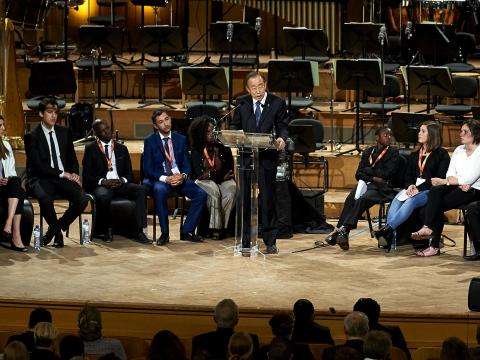Taking children’s views seriously

By Patricio Cuevas-Parra, senior policy advisor, Advocacy and Justice for Children - WVI
I truly know what it feels like to be voiceless, I was born in a generation where being a child meant having little space to express our feelings and opinions. This led me to ponder on what lessons we can draw from influential people on the international stage and their views on the inclusion of children and young people.
Last week, I attended "The Post-2015 Agenda and the Role of Youth" conference in Brussels, where the UN Secretary-General, Mr. Ban Ki-moon, met 1,200 children, young people and youth from more than 100 countries. It was refreshing to see the great importance that Ban Ki-moon placed on the contribution that children and young people offer to development, peace and justice. He said that children and young people are not the future as many people call them; on the contrary, they are the present and their inclusion is pivotal to achieving development goals and targets.
The conference featured an interactive debate between the Secretary-General and a selected group of 15 children and youth ambassadors. Three of these young ambassadors were from World Vision: Nour, aged 15 from Lebanon, Maruba, aged 14 from Zambia, and Edglieson, aged 22 from Brazil. They all asked important questions on issues of importance to them and their peers such as displacement and forced migration, violence against young people and lack of participation in decision-making. The Secretary-General answered all the questions with full candour. He made it clear that rethinking values and priorities was vital for changing traditional participatory practices that exclude children and young people from public debates.
This meeting was an important first step in highlighting on a very visible and international stage, how major global decision-makers can promote the participation of children and young people. I was told that Ban Ki-moon firstly insisted on having this conference with young people. Secondly he gave more prominence to his meeting with children and young people by allocating more time for them than for his meetings with members of the European Parliament. His approach really set the stage for a thrilling experience both for the young delegates and for us observers.
Listening to Ban Ki-moon, made me reflect on why one of the most influential people in the world is so committed to child and young people's participation, when many others appear to just ignore or exclude them.
As Senior Policy Adviser, I have attended countless conferences, seminars and meetings with the aim of bringing children and young people's voices into decision-making and opening spaces for their active participation in public debates. While there has been support in some quarter, so often, I have been challenged based on the same arguments: children and young people are not capable of forming their own ideas, their participation is tokenistic, we do not have the capacity to include them in our work, and so on. While it has never come to my mind to give up I obviously get frustrated. Ban Ki-moon's speech reaffirmed my convictions and made me realise that it is important to continue what at times seems like a difficult task.
I do not dispute that there are many issues that require careful consideration such as ethics, protection, and empowerment but from my perspective these issues should not prevent children and young people from participating. Our job is to develop strategies to minimise and eliminate those risks not give up completely because we might not have all the right answers now. Our job is to make a start and to work out paths and ways as we go along.
The three World Vision young ambassadors, Nour, Maruba and Edglieson, have proven that children and young people are competent and articulate social actors who are capable of making their voices heard. They can do everything possible to participate in public debate in order to make a change on issues that are relevant to them. Nour, Maruba and Edglieson's had a strong sense that they were there on behalf of many. They did not speak about themselves; they spoke on behalf of and about their peers and all the others whom they represent. They have taken those first crucial steps and it is our job to meet them half way and to encourage, support and nurture their dreams and aspirations.
About the author
Patricio Cuevas-Parra is the Senior Policy Adviser on Child Participation at World Vision International. He leads and develops the cross-organisational implementation of resources to carry out child participation initiatives at the local, national and international levels. He also leads broader efforts to ensure the development of policies, practices and programmes in order to strengthen child participation in advocacy.